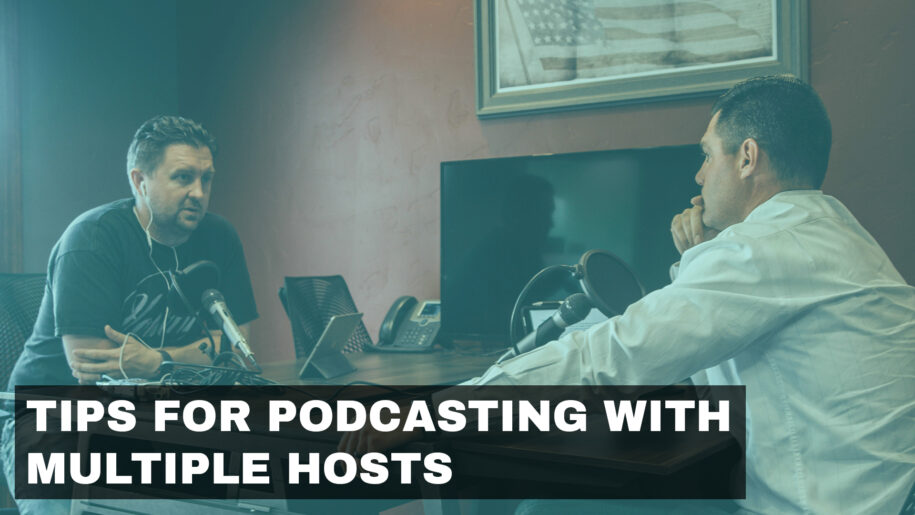Podcasting with multiple hosts can bring diverse perspectives and lively conversations to your show, making it more engaging for your audience. However, managing a podcast with multiple hosts also presents unique challenges, such as coordinating schedules, ensuring balanced contributions, and maintaining audio quality. Here are some tips to help you successfully navigate podcasting with multiple hosts.
1. Plan and Prepare Together
Effective planning is crucial when multiple hosts are involved. Establishing a clear structure and shared goals ensures everyone is on the same page.
Key Strategies:
- Regular Meetings: Hold regular planning meetings to discuss episode topics, assign research tasks, and outline episode structures.
- Shared Documents: Use collaborative tools like Google Docs or Trello to create and share episode outlines, research notes, and scripts.
- Clear Roles: Define each host’s role in the podcast (e.g., main host, co-host, researcher) to streamline responsibilities.
2. Coordinate Schedules
Scheduling can be challenging with multiple hosts, but it’s essential to ensure regular recording sessions.
Key Strategies:
- Shared Calendar: Use a shared calendar (e.g., Google Calendar) to schedule recording sessions and deadlines.
- Doodle Polls: Use tools like Doodle to find common availability for all hosts.
- Buffer Time: Schedule buffer time before and after recording sessions for setup and discussion.
3. Maintain Consistent Audio Quality
Consistent audio quality is vital for a professional-sounding podcast. Each host should have access to good recording equipment and a quiet recording environment.
Key Strategies:
- Microphones: Invest in high-quality microphones for each host. USB microphones like the Audio-Technica ATR2100x or XLR microphones like the Shure SM7B are great options.
- Recording Software: Use reliable recording software that supports multiple tracks, such as Audacity, GarageBand, or Adobe Audition.
- Soundproofing: Encourage hosts to record in quiet, soundproofed environments to minimize background noise.
4. Foster Good Communication
Effective communication among hosts is essential for smooth recordings and dynamic conversations.
Key Strategies:
- Hand Signals: Develop non-verbal cues (e.g., hand signals) to communicate during recordings without interrupting the flow.
- Respect Speaking Time: Encourage hosts to listen actively and avoid talking over each other. Use a talking stick or signal to manage speaking turns.
- Feedback Sessions: Hold regular feedback sessions to discuss what’s working well and areas for improvement.
5. Edit Thoughtfully
Editing a podcast with multiple hosts can be more complex, but it’s essential for creating a polished final product.
Key Strategies:
- Separate Tracks: Record each host on separate tracks to make editing easier and ensure balanced audio levels.
- Edit for Flow: Cut out long pauses, interruptions, and tangents to maintain a smooth flow of conversation.
- Consistency: Apply consistent audio processing (e.g., equalization, compression) to ensure uniform sound quality across all hosts.
6. Engage Your Audience
Multiple hosts can offer varied viewpoints and richer content, making it easier to engage your audience.
Key Strategies:
- Listener Questions: Invite listeners to submit questions or topics for discussion.
- Live Interactions: Consider live recording sessions with audience participation through platforms like Zoom or YouTube Live.
- Social Media: Use social media to promote episodes, share behind-the-scenes content, and engage with your audience.
7. Handle Conflicts Professionally
Conflicts can arise when working closely with others, but handling them professionally is key to maintaining a positive working relationship.
Key Strategies:
- Open Communication: Encourage open and honest communication about any issues or disagreements.
- Conflict Resolution: Address conflicts promptly and professionally, focusing on finding solutions that benefit the podcast.
- Respect: Maintain respect for each other’s opinions and contributions, even when disagreements occur.
Podcasting with multiple hosts can enhance your show’s content and appeal, but it requires careful planning, effective communication, and thoughtful editing. By following these tips, you can create a seamless and engaging podcasting experience for both your hosts and your audience.


